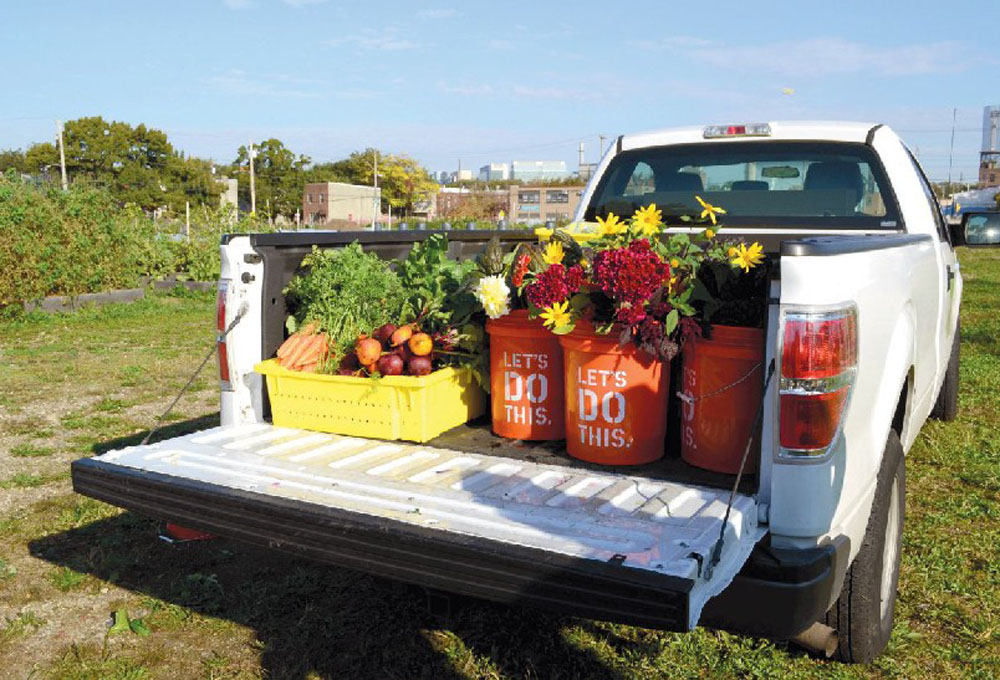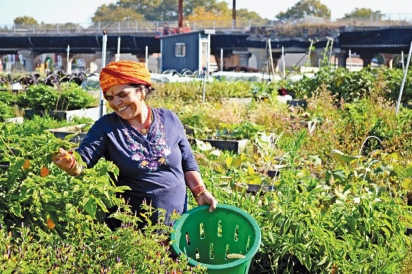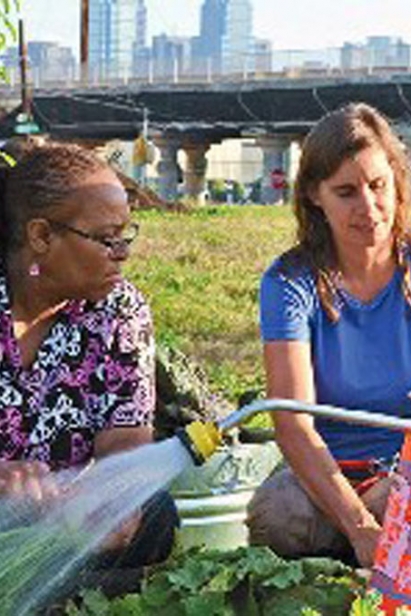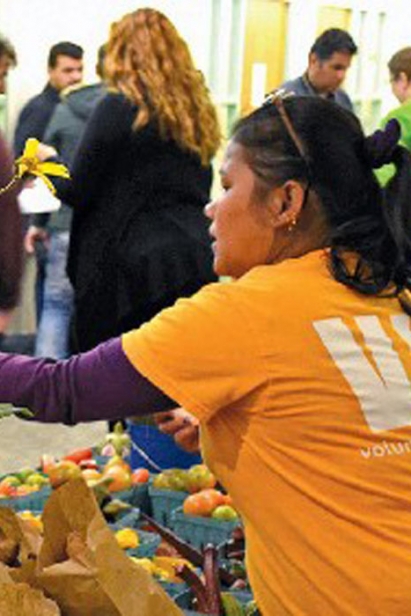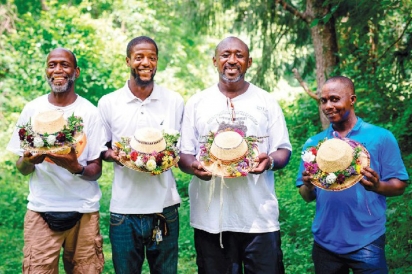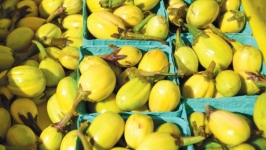In a Grays Ferry Garden, Opportunity Grows
Urban agriculture helps refugees get a fresh start in Philadelphia
As the sun rises over West Philly, a quiet hum of work is under way at the Growing Together Garden at 25th and Reed Streets. Tomorrow is market day at the Nationalities Service Center (NSC), Philly’s largest refugee-resettlement agency, and there’s much to be done. Beets are picked and arranged, bright like gems. Orange, yellow and bright-purple carrots are gathered into bunches.
Outside the locked gates of the 2.8-acre expanse, freight trains rumble by and the city awakens. Folks gather outside the N-Motion barbershop, talking over chirping work trucks. Kids in uniforms amble off to classes. The garden is an oasis below the 25th Street Viaduct—and between the organically tended beds, more is happening than meets the eye.
Just past the washing station, members of the Beginning and Veteran Farmer Training Program are busy sorting the day’s harvest. A joint project between NSC, the East Park Revitalization Alliance (EPRA) and the Pennsylvania Horticultural Society (PHS), the program brings together farmers-in-training from two groups. Three participants are NSC refugee clients, some of whom bring agricultural experience from home. The rest are affiliated with EPRA, which aims to empower residents of Strawberry Mansion through the environment, education and the arts.
As tomatoes and peppers are placed into bins, EPRA participant Cynthia Criniti approaches with an eight-inch green bean in hand. A debate ensues: Is it sellable? Dropada Kaflay looks up and interprets from Nepali to English, with the help of fellow ethnic- Nepali refugee Mon Gurung. “It’s good, it’s good,” Kaflay nods. Any bigger, though, and it would be tough, better for seed saving.
Kaflay would know. Growing up in Bhutan’s agriculturally rich southern region, she and her family were expert farmers. Then they were forced to flee in 1992 during a period of ethnic cleansing by the Bhutanese government that started to unfold in the late 1980s and reached a fever pitch by the 2000s. During the expulsion, Nepali families who had tended the same land for generations were forced to revoke any claim.
“We had a big garden,” Kaflay recalls. “We had cows and buffalo, rice and corn … everything.” After 18 years living in refugee camps in Nepal, Kaflay and her family made their way here in 2010. Through programs like this, she and other refugees are reclaiming a connection to the land.
Gurung grew up hearing about her family’s farm, though most of her childhood was spent in a camp. “It is different farming in Philly than in our country,” Gurung says. “My family farmed, but I was too little.” For her, the program is a link to her history and a way to start a new chapter of her life in the United States.
Tomorrow morning, she and her fellow farmers will cull mustard greens into clusters of amethyst and emerald just hours before market. Thai roselle, a tart-sour leaf used from Bhutan to the Democratic Republic of the Congo (DRC), will be tied into enormous bouquets, a nod to its popularity. At the NSC Refugee Farmstand, you can find many specialty crops like these. It’s all part of the plan.
Propagation from within Situated on land leased by NSC, Growing Together serves a diverse group of gardeners. One mission, however, unifies everything. This is a hub where growers with limited food budgets are learning to grow affordable, organic food right in the middle of the city.
It’s NSC’s second garden. The first, Growing Home at Emily and Mercy Streets, launched in response to queries from Burmese and Bhutanese refugees and became so popular that a waiting list of 200 families developed. In 2014, land for Growing Together was secured. Both gardens are supported through partnerships with PHS, the Department of Parks and Recreation and the Neighborhood Gardens Trust.
On the north side is the expanded community space, 250 beds strong and growing. On the south side is the entrepreneurial garden, where eight farmer trainees, including Gurung, Kaflay and Criniti, are uncovering what it takes to launch an urban-agriculture business.
Established in January 2016, this agricultural training program is part of the USDA Philly Farms Project. A PHS Community Food Project grant covered infrastructure, materials, and a $45,000 irrigation system. 2014 Farm Bill funding covers stipends, materials, and training. NSC fundraising bolsters the program, including the recent hire of a full-time farm manager—but more on that later.
PHS City Harvest administers the training, and the mission goes well beyond the cultivation of agricultural savvy. By shepherding the creation of viable business plans, the program aims to foster self-sustaining sources of healthy food in underserved communities. It’s about empowerment from within, critical in a food-insecure Philly where more than 475,000 qualify for SNAP benefits.
Strawberry Mansion, where EPRA is located, is one of the poorest neighborhoods in the city. Nearly half of its residents earn less than $15,000 per year. Refugees face their own hurdles, from the pressures of being resettled into poverty to a political environment where their very presence has become a matter of debate.
During the past decade, City Harvest has come to support 140 gardens, serving as a lifeline in the form of soil, expertise and a quarter of a million young plants annually. The need for the program is clear. “The statistics regarding hunger in the city are mind-boggling, and should be mind-boggling to everyone,” says Lisa Mosca, community food systems director at East Park Revitalization Alliance.
Spend a day with Mosca in any one of the gardens, where she manages much of the education, and you realize that it’s all about propagation, both technical and philosophical. It starts with seeds. It encompasses creation of urban garden space. And, ultimately, it’s about empowerment. “The more we can do to make communities part of propagation, the better,” Mosca says.
At NSC, planting for a diverse refugee community means paying close attention to an array of food cultures. When Growing Home officially launched in 2011, sponsors realized that Bhutanese and Burmese gardeners needed a voice in crop selection. Beds were planted with marigolds, Thai roselle and mustard greens. With the 2014 arrival of refugees from the DRC, attention turned to cassava (a challenge) and sweet potato leaves.
“When we were in the planning stages for Growing Home, people were driving hours to get roselle that was in most cases heavily sprayed,” Mosca explains. The plan is for such specialty crops to become more widely available, but there’s more to it. Mosca wants people from every community to have healthy, organic food.
To make that a reality, City Harvest develops partnerships with groups that have the capacity and demand to build sustainable urban-garden programs. “PHS felt that NSC and EPRA had farmers with potential business plans that were very solid,” says Juliane Ramic, NSC’s senior director for refugee and community integration. “But they needed a place to grow.”
Now the two organizations together provide the space to support the joint program. The primary growing space comes from NSC, while EPRA has land where the group hopes to erect a greenhouse. Cultivating community Observing Mosca in the garden, where she advises her trainees on growing, marketing, and business planning, three words come to mind: Force of nature. At any given moment, she might be harvesting tomatoes, coordinating volunteers and answering technical questions, often all at once.
The farmer-training curriculum is designed to mimic the cycle of a season, from planting and propagation to field cropping, food safety, recordkeeping and organic pest control. Each trainee spends at least 50 hours per month farming and learning about value-added agricultural businesses, while attending classes and taking field trips to farms and gardens nationwide. Those trips can prove transformational.
“The world is getting more food conscious,” says Malik Savage, who hopes to specialize in cut greens with fellow EPRA farmer Shaheed Oliver. “As long as you’re in food, you’ll always have a business.” He says he was struck by the things he discovered during travels to farms as far away as Detroit. Oliver concurs: “I can’t get enough of this information,” he says. “It’s bringing us closer to our roots.”
For the refugee farmers, Mosca says something important clicked when they toured established refugee gardens in places like Cleveland. “We wanted them to see these spaces where others were successful,” Mosca explains.
Merthus Mbonigada showcases one such example in the form of African eggplant. During a group trip to Fresh Start Farms in Nashua, New Hampshire, Mbonigada got eggplant seeds from a fellow Congolese farmer and introduced the small, slightly bitter fruits to Philly for the first time in 2016. He takes pride in being able to sell it at the farmstand for an affordable price.
Mbonigada has traveled a long way to these verdant beds. Born in Rwanda and raised in the DRC, Mbonigada, his wife, and their five children were resettled in 2015 after spending 12 years in a Namibian refugee camp. Trained as a nurse, he was a teacher in his camp, launching a garden there with an eye on helping the next generation find opportunity. When the farmer-training program opportunity arose in Philly, it was a natural fit—a way to build something tangible while working to reattain his nursing certification.
Five additional farmers are supported by EPRA, including Savage and Criniti. The bonds that have formed among the eight are striking, cultivated over the course of a season where crops demand constant tending. “We’re a family,” says EPRA farmer Linda Hayes. “I’ve learned so much.”
“City Harvest taught me how to grow,” Criniti says. “My grandmother grew. My mother grew. Most of what I have, I donate to senior centers and neighbors. You can take a pack of seeds and you have 50 plants—for what? $2.35 a pack?”
Criniti is modest. According to Mosca, she has been donating fresh-grown produce to neighbors for years. When she retired from SEPTA last spring, she decided to deepen her agricultural education.
In time, these eight farmers will work to launch businesses that benefit their communities, with continued support from NSC, EPRA and City Harvest. If the 2016 pilot of the farmers’ market at NSC is any indication, they will find ample demand.
The power of an eggplant
The NSC lobby may be one of the most global spaces in the city. Exiting from the elevator, you’re greeted in a chorus of languages: French, Swahili, Arabic, Farsi, Kinyarwanda. People come and go in waves, attending language classes, studying for naturalization exams, and learning the ropes of life in their new city. In 2016, NSC resettled 537 refugees from countries including Syria, Eritrea and the DRC.
The goal is to help each client achieve self-sufficiency. That means jobs, stability, and security, all critical milestones for refugees. “The U.S. resettlement program has always emphasized early employment as the key to self-sufficiency,” Ramic explains. Of late, much time has also been spent reassuring clients of their welcome in the city.
Approaching the farmstand, people’s eyes light up at the sight of crops rarely seen in the city. Thai roselle, it turns out, goes by many names: sorrel, sour sour, chin baung. African eggplant is of equal interest to the Congolese and ethnic Nepalis, who stir-fry it with hot peppers, potatoes, cilantro and tomatoes. Before Mbonigada introduced it, many had been searching for it to no avail—even if you could find that kind of specialty crop, it would command a high price. Here, it’s designed to meet the budgets of families just getting their footing, and it’s vibrant and gorgeous.
As the hours pass, okra sells out first, a staple in stews and curries. Peppers are preferred hot and come in a rainbow of colors. As her trainees work the table, Mosca seeks their thoughts on pricing for bags of lettuce mix—always teaching.
At day’s end, everything that remains is donated to new refugee arrivals. More than altruism, it’s part of the business plan developed by Mbonigada, Kaflay and Gurung. Given the limited means that define refugees’ early months in the city, the difference the fresh produce makes can’t be understated.
Ramic shares an example. Last summer, late in the season, a recently resettled client from the DRC was in her case manager’s office. The market had just ended, and Ramic brought in a quart of Mbonigada’s African eggplant, asking if it was familiar. In that moment, Ramic recalls, it was if everything in the world stopped.
“She looked up and said, ‘How did this woman know that I have been looking for these? We have gone to Asian markets. We have gone to the grocery stores near our home. We have asked all of our friends. I have wanted to make a dish that would be a taste of home for my family.’”
“She just huddled over them saying, ‘Asante. Asante.’ Thank you. Thank you,” Ramic says. “Nothing else mattered after that.”
Going forward, Mbonigada will have more opportunities to make scenes like this happen. In October 2016, he was hired as the Growing Together farm manager, where he will support both the community and entrepreneurial gardens while earning a steady, grant-supported stipend. He hopes to see the market expand, potentially to additional locations in the city. If anyone can accomplish that, he can: A speaker of six languages, he has a special way of connecting with people. Again, things come full circle. It’s all part of the plan.
Visit the NSC Refugee Farmstand Wednesday mornings beginning in mid-June. For more information, visit nscphila.org.
Nationalities Service Center & Farmstand
1216 Arch Street, 4th Floor
215.893.8400 nscphila.org


